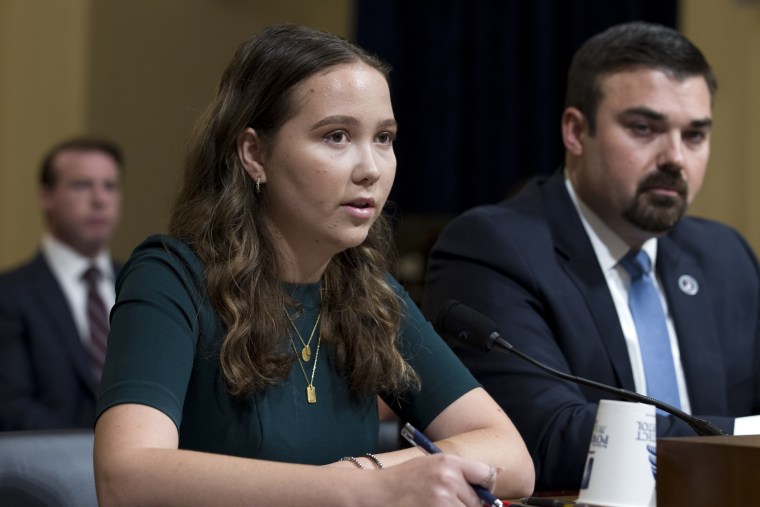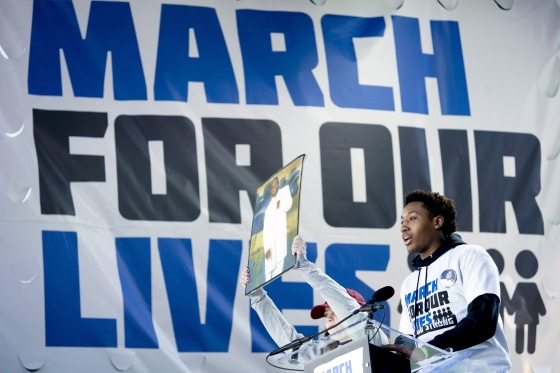During the Democratic National Convention on Wednesday night, images of the aftermaths of school shootings, including the shootings at Marjory Stoneman Douglas High School in Florida in 2018, flashed on the screen.
Scenes from other mass shootings were also shown, including the shootings at an outdoor concert in Las Vegas in 2017 and at Sandy Hook Elementary School in Connecticut in 2012.
"People affected by everyday gun violence have to walk by the street corner where their best friend, their brother, their mother, their nephew, where they themselves were shot, and life goes on and on as if we haven't just watched a loved one die and get put in the grave," spoke the voice of Emma Gonzalez, a co-founder of the March For Our Lives movement, who survived the high school shooting in Parkland, Florida.
March For Our Lives, a youth-led gun violence prevention group born out of the Florida shooting, which killed 17 people, is working to encourage young people to become politically engaged and to push for a future free from gun violence.
November will mark the first presidential election for many members. Despite the coronavirus pandemic, the group is still working to ensure that young people are educated about the issues and are registered to vote.
Two members said they're optimistic that young people will turn out to vote in increased numbers, as they did in 2018, yet the mood among their peers can be summed up in one word: "hopeless."
"At this point, I'm not going to lie, it's a huge sense of hopelessness, just because there's so many factors going against us," said Trevon Bosley, 22, of Chicago, whose brother and cousin were victims of gun violence.
Download the NBC News app for breaking news and alerts
Bosley, a member of March For Our Lives and the anti-violence group The BRAVE Youth Leaders, pointed to the rise in gun violence, police brutality and the coronavirus pandemic, which has disproportionately affected Black and brown Americans, as reasons his generation feels a sense of despair.
"But that's why I'm here, and that's why youth like us are here, to try and keep everyone hopeful that we can continue to fight, and we will get through these things, even though they seem like a mountain. We'll get through it," he said.
National groups like March For Our Lives and local groups in Chicago have been unable to hold their typical rallies and marches because of COVID-19, Bosley said.

Another co-founder of March For Our Lives, Lauren Hogg, 17, who was a freshman at Marjory Stoneman Douglas at the time of the shooting, said: "So much of our success is in our community, in being together, in being able to see each other and supporting each other. ... This year has really stretched this idea of organizing and made us have to find a community over social media, over phone calls. Hopefully, when things get better, we'll be able to resume how things were before."
Although their activism has been forced into mostly digital spaces, the issues they're fighting are still as prevalent as they were before the pandemic.
With schools operating remotely through much of 2020, at least one month this year marked the first time in decades that the U.S. had not had a school shooting, according to the activist group Sandy Hook Promise. However, shootings overall have spiked during the pandemic, in some cases breaking records.
Major cities, including New York, Philadelphia and Chicago, all had increases in shootings from the previous year.
The Chicago Police Department reported that shootings increased by 76 percent from the same period last year, with nearly all the violence concentrated in the city's predominantly Black and brown communities on the South and West sides.
"For us, and a lot of people in the cities around the country, staying informed about gun violence, you don't necessarily have to turn on the news to know what's still going on. Most of us are still experiencing it," Bosley said. "So many of the people are just as passionate as they were before, because they still see it happening in their daily lives."
On Friday, the group announced a tour, part digital, part in-person, to continue to spread its message and raise awareness while encouraging voter registration and youth turnout in the election.
March For Our Lives will debut art exhibits in Arizona, Colorado, Florida, Georgia, Michigan, North Carolina, Pennsylvania, Texas and Wisconsin, in addition to holding digital meetings, to raise awareness of "systemic issues that intersect with the mission of gun violence prevention, including racial injustice, immigration, healthcare and economic inequality," according to a news release.
The group hopes the efforts will lead to a spike in registration similar to the increase in 2018, when March For Our Lives registered more than 50,000 voters nationwide and helped increase youth voter registration in Florida by 41 percent, according to a March For Our Lives spokesperson.
Although young people may feel hopeless, the desire to see things improve could override the sense of despair and get them to the polls in November, Hogg said. Hogg and Bosley agreed that young people want change and that many recognize that voting is one path to accomplish that.
"I really think young people are going to show up, because we've seen the difference between one president to another and how different and important our leaders really are," Hogg said of young voters' experience growing up through the Obama and Trump presidencies.
Bosley warned that if people don't act, the issues he and Hogg are fighting will only get worse.
"People are literally dying every day, and unless you get up and do something about it, people will continue to die, and violence is just going to get worse and worse until it's at your doorstep," he said.


